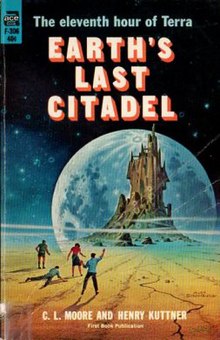On days when I have nothing to do I like to walk to the park
in my neighborhood to read. Depending on my mood I’ll either take the direct
route or I’ll amble around slightly, taking my time and letting my mind wander.
The other day I was doing just that when I walked by a garage sale. There was a
table of books and, well, far be it from me to pass by a table of books without
a second glance! Mostly it was old cookbooks and school books that I had no
interest or need for (I’m trying to be less of a pack rat). However, stuck
amidst those things were two old, yellowed science fiction paperbacks.
- Earth’s Last Citadel by C. L. Moore & Henry Kuttner (1943)
- The Book of Van Vogt by A. E. van Vogt (1972)
 Reader, I bought
them.
Reader, I bought
them. The woman only charged me $1.50 for both, which is pretty close to the prices they had listed on them anyway. I asked if she had anything else like them and she told me she didn’t. Apparently they had been left behind by whoever had lived in the house before. Looking at them later when I had finally got to the park I found it hard to believe that they had just been carelessly forgotten. They seemed well-worn from multiple readings. The spines were broken, the pages thin and fragile, the covers bent. They reminded me of the collection of Conan books my dad left behind when he passed away.
I was excited to
find them, mostly because I like the way old genre paperbacks look, but also
because these are some serious Golden Age authors.
C. L. Moore was one of the first women to become
prolific in the science fiction and sword-and-sorcery genres. Often she
published under pseudonyms or simply with her initials because it wasn’t easy
to get published as a woman at the time. She met her husband Henry Kuttner, also a science fiction
writer, because he wrote her a fan letter while under the impression that C. L.
Moore was a male writer like himself. After they were married they wrote most
of their work collaboratively. If anyone has seen the movie The Last Mimsy it’s
loosely based on one of their better none short stories together.
A. E. van Vogt is one of those science fiction names that
you know even if you haven’t read anything he wrote. He’s big, though people’s
opinions of him are varied. Some consider him to be a master, one of the most
influential people writing during the Golden Age. And some people think he’s a
hack. I’ve only read one short story by him so I haven’t made up my mind yet,
but I’m excited to see what this collection of short stories has to offer.
For me, this is one of the most engaging things about being
a science fiction fan. There is such a rich, storied history of work that is
never pressed upon you in school. Finding these sorts of books is an adventure
in and of itself.
Most of the science fiction that forms the basis for my
personal canon is mostly from the New Wave movement. I very rarely dip back down into things
from the Golden Age. It isn’t that I don’t have the interest but rather because
there is just so much to catch up on from the era that I find most comfortable
to new books that are being published every day. These are the books that the
authors that inspired me were inspired by. These are the books that form the
basis of the personal canon of the people who fill my own. Here's Isaac Asimov (who we all know and love!) talking about the Golden Age of Science Fiction:
Now, I’m sure that there’s going to be a plethora of
problematic things to work through in these stories. C. L. Moore and Henry
Kuttner were both friendly with H. P. Lovecraft who’s kind of known for being a
big ol’ racist. A. E. von Vogt helped L. Ron Hubbard with Scientology back in
the 50s. But I’m positive I’ll find things of value and worth in the texts as
well because people I admire found value and worth in them. People whose texts
weren’t filled with racism or sexism or anything else that society has finally
realized sucks. Things change and people grow and that’s exactly what science fiction
is talking about anyway.
I doubt that these books will make it into my personal canon
(which is how I refer to the texts that have shaped me as a science fiction
reader and writer), but I’m sure that they’ll provide me with something. Even
if it’s just some insight into the thought process of the people that have
shaped me. I also just find it interesting to see what people from different generations
thought about when they thought about science fiction and the future and what
tomorrow might bring. It’s fascinating to see people outside my own
contemporaries puzzling through social issues or big philosophical questions. I
believe I mentioned that interest in my first post.
Time moves on.
Society changes.
But good writing and creative ideas… They stay important.

No comments:
Post a Comment